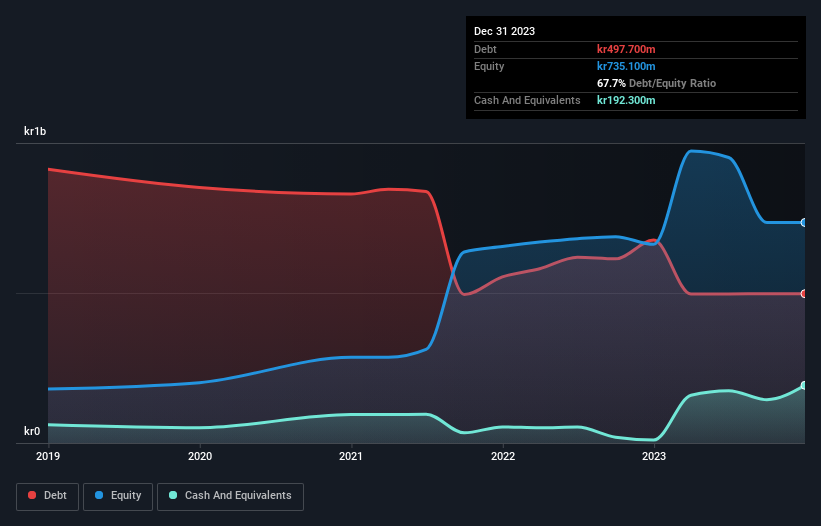Some say volatility, rather than debt, is the best way to think about risk as an investor, but Warren Buffett famously said that 'Volatility is far from synonymous with risk.' So it seems the smart money knows that debt - which is usually involved in bankruptcies - is a very important factor, when you assess how risky a company is. Importantly, CTEK AB (publ) (STO:CTEK) does carry debt. But the more important question is: how much risk is that debt creating?
What Risk Does Debt Bring?
Debt assists a business until the business has trouble paying it off, either with new capital or with free cash flow. Part and parcel of capitalism is the process of 'creative destruction' where failed businesses are mercilessly liquidated by their bankers. While that is not too common, we often do see indebted companies permanently diluting shareholders because lenders force them to raise capital at a distressed price. Of course, plenty of companies use debt to fund growth, without any negative consequences. When we think about a company's use of debt, we first look at cash and debt together.
View our latest analysis for CTEK
How Much Debt Does CTEK Carry?
As you can see below, CTEK had kr497.7m of debt at December 2023, down from kr676.7m a year prior. However, because it has a cash reserve of kr192.3m, its net debt is less, at about kr305.4m.

A Look At CTEK's Liabilities
The latest balance sheet data shows that CTEK had liabilities of kr171.0m due within a year, and liabilities of kr610.3m falling due after that. Offsetting this, it had kr192.3m in cash and kr152.5m in receivables that were due within 12 months. So its liabilities outweigh the sum of its cash and (near-term) receivables by kr436.5m.
This deficit isn't so bad because CTEK is worth kr1.25b, and thus could probably raise enough capital to shore up its balance sheet, if the need arose. But it's clear that we should definitely closely examine whether it can manage its debt without dilution. When analysing debt levels, the balance sheet is the obvious place to start. But ultimately the future profitability of the business will decide if CTEK can strengthen its balance sheet over time. So if you're focused on the future you can check out this free report showing analyst profit forecasts.
In the last year CTEK had a loss before interest and tax, and actually shrunk its revenue by 5.5%, to kr898m. We would much prefer see growth.
Caveat Emptor
Importantly, CTEK had an earnings before interest and tax (EBIT) loss over the last year. Indeed, it lost a very considerable kr194m at the EBIT level. Considering that alongside the liabilities mentioned above does not give us much confidence that company should be using so much debt. Quite frankly we think the balance sheet is far from match-fit, although it could be improved with time. We would feel better if it turned its trailing twelve month loss of kr257m into a profit. So to be blunt we do think it is risky. For riskier companies like CTEK I always like to keep an eye on whether insiders are buying or selling. So click here if you want to find out for yourself.
When all is said and done, sometimes its easier to focus on companies that don't even need debt. Readers can access a list of growth stocks with zero net debt 100% free, right now.
New: AI Stock Screener & Alerts
Our new AI Stock Screener scans the market every day to uncover opportunities.
• Dividend Powerhouses (3%+ Yield)
• Undervalued Small Caps with Insider Buying
• High growth Tech and AI Companies
Or build your own from over 50 metrics.
Have feedback on this article? Concerned about the content? Get in touch with us directly. Alternatively, email editorial-team (at) simplywallst.com.
This article by Simply Wall St is general in nature. We provide commentary based on historical data and analyst forecasts only using an unbiased methodology and our articles are not intended to be financial advice. It does not constitute a recommendation to buy or sell any stock, and does not take account of your objectives, or your financial situation. We aim to bring you long-term focused analysis driven by fundamental data. Note that our analysis may not factor in the latest price-sensitive company announcements or qualitative material. Simply Wall St has no position in any stocks mentioned.
About OM:CTEK
CTEK
Develops, markets, and sells battery charging products for vehicles in Sweden, Nordics, DACH, the Americas, rest of Europe, and internationally.
Undervalued with excellent balance sheet.
Market Insights
Community Narratives





